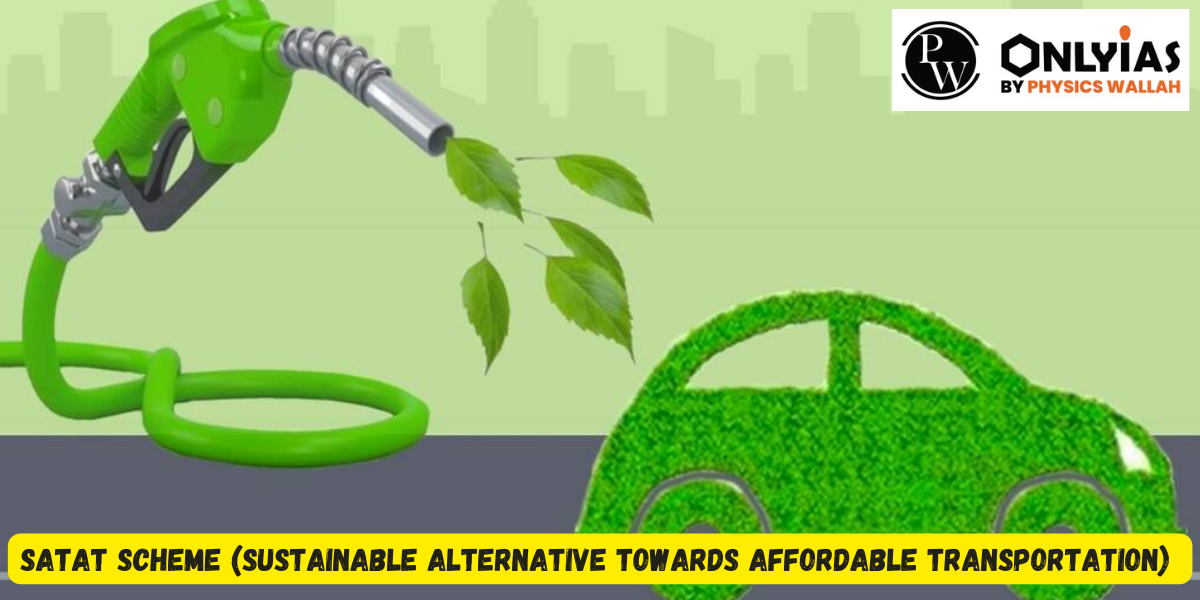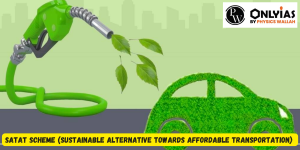The SATAT Scheme, which stands for Sustainable Alternative Towards Affordable Transportation, is an initiative led by the Government of India.

SATAT Scheme: The SATAT Scheme, which stands for Sustainable Alternative Towards Affordable Transportation, is an initiative led by the Government of India. Its primary objective is to establish Compressed Biogas production facilities and make this eco-friendly fuel available for automotive use. The government aims to achieve this by inviting expressions of interest from potential investors.
Launched in October 2018, the SATAT Scheme is a collaborative effort between the Ministry of Petroleum and Natural Gas and several oil-related public sector units, including Bharat Petroleum Corporation and Hindustan Petroleum Corporation.
This scheme plays a crucial role in upholding India’s commitment to reducing carbon emissions and fulfilling international agreements such as the Paris Agreement.

Compressed Biogas (CBG) is a sustainable and renewable fuel derived from the anaerobic decomposition of organic materials such as agricultural residues, food waste, animal dung, and sewage.
The anaerobic digestion process involves the breakdown of these organic materials in an oxygen-free environment, resulting in the production of biogas as a byproduct.
Biogas is primarily composed of methane (CH4) and carbon dioxide (CO2), with smaller quantities of other gases.
Following the production of biogas, it can undergo further purification and compression to become Compressed Biogas (CBG), which shares similar properties and applications with Compressed Natural Gas (CNG).
CBG serves as an alternative fuel suitable for a variety of applications, primarily as a cleaner and more environmentally friendly substitute for conventional fossil fuels.
The adoption of Compressed Biogas (CBG) as an alternative fuel aligns with global endeavors to combat climate change, reduce environmental pollution, and promote sustainable development.
The SATAT scheme is designed with the following key objectives in mind:
Biogas is naturally produced through the anaerobic decomposition of waste or other biomass sources. Compressed Biogas, a product of this process, shares similar properties with commercially available natural gas in terms of composition and energy potential. Therefore, it can serve as an alternative energy source for automobiles.
Given India’s abundant biomass resources, Compressed Biogas has the potential to replace natural gas in various industrial and commercial applications.
The Sustainable Alternative Towards Affordable Transportation, facilitated by Compressed Biogas (CBG), offers several advantages, including:
The primary implementation method of SATAT involves entrepreneurs proposing the establishment of Compressed Biogas plants. These plants will produce CBG, which will be transported in cylinders to fuel stations across the country.
Entrepreneurs will have the opportunity to market other by-products generated by these plants, such as bio-manure and carbon dioxide, to enhance their returns on investment.
The government has plans to establish approximately 5,000 CBG plants across the country in a phased manner, with the ultimate goal of achieving this by 2025. These plants are expected to produce about 15 million tons of Compressed Biogas annually, generating employment for around 45,000 people.
| Also Read | |
| SERB-POWER Scheme | NIRVIK Scheme (Niryat Rin Vikas Yojana) |
| MISSION SAGAR | SVAMITVA Scheme |
| Must Read | |
| NCERT Notes For UPSC | UPSC Daily Current Affairs |
| UPSC Blogs | UPSC Daily Editorials |
| Daily Current Affairs Quiz | Daily Main Answer Writing |
| UPSC Mains Previous Year Papers | UPSC Test Series 2024 |
The Minister of Petroleum and Natural Gas recently presented the 100th Letter of Intent (LOI) to a Compressed Bio-Gas (CBG) Entrepreneur (producer) as part of the Sustainable Alternative Towards Affordable Transportation (SATAT) scheme.
Biogas is generated through the anaerobic decomposition of waste and biomass materials, such as agricultural residue, cattle dung, sugarcane press mud, municipal solid waste, and sewage treatment plant waste.
The compensation for the Plant owner will be determined based on the procurement price of Rs. 46 per kilogram of CBG, plus applicable taxes, until March 31, 2024. This applies to CBG delivered at a Retail Outlet located within 25 kilometers from the CBG Plant, using a cascade with 250 bar pressure.
Due to production costs being 20 to 50% lower than those of alternative fuels such as CNG and other petroleum products, Bio-CNG is considerably more economical than both CNG and other fuel options.
The Minister of Petroleum inaugurated the Satat Initiative with the aim of promoting compressed biogas as an environmentally sustainable fuel for transportation.
<div class="new-fform">
</div>